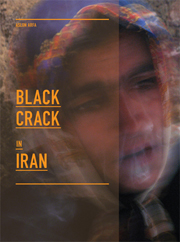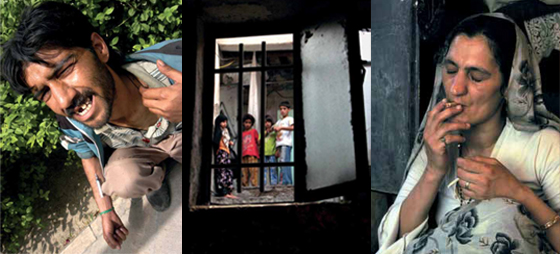| Email not displaying correctly? View it in your browser. |

FOR IMMEDIATE RELEASE:
Capturing images of the private life of Iranians is a difficult task and sometimes seems almost impossible. Certain Iranians do not like to be photographed at all because of their traditions, religious beliefs, and culture; others do not like it because of their fear of the country's strict laws and regulations. You simply cannot take photos of certain daily routines of a typical Iranian family in their own home. Women, for example, do not need to cover their hair inside their homes; however society dictates that they must put on scarves when posing in photos. This is either because they themselves are religious and feel uncomfortable not covering up, or because they believe they must obey the laws. Therefore, the photo you take does not demonstrate their true lives. Capturing real images of Iranian addicts is incalculably more difficult. Neither female nor male addicts like to be photographed. Their resistance comes from a combination of shame, because they are worried about their reputation among people who know them, and fear, because the penalties for possession and distribution of drugs are severe and can even result in death. To make Black Crack in Iran, I hung in places in Tehran that were full of criminals, dealers, and addicts. In the parks where I would go to find them, you could see used needles everywhere on the ground. It took a long time for me to get the people to trust me, to let me go inside their houses and take picture of them while they were living their normal lives and doing their normal chores—including, of course, smoking crack and shooting up. Sometimes I was completely unsuccessful. For instance, one woman allowed me to photograph her, but her landlord wouldn't let me in the house. In some cases the husband wasn't addicted, and he did not let me take the pictures. Due to these and similar limitations I could not do many of the things I would have liked to, but I believe these pictures are the as accurate a portrait of crack addicts in Iran as is possible. It is my intention that by exposing their plight in a raw, intense, and accurate way, the attention will bring aid and hope to an otherwise hopeless group. For a preview of the book please visit: http://www.powerHouseBooks.com/blackcrackiniran.pdf Aslon Arfa was born in Tehran, in 1970. When he was 17, he became a photo assistant for Kamran Adle (a noted Iranian photographer) and worked with him for several years. Arfa studied Atomic Physics at Tehran University, but after graduating he started working as a photographer for Danestaniha magazine where he worked until 1998. He also worked for an Iranian newspaper for a year and spent another year working for Iranvich Daily. Arfa has worked on several journalistic photography projects, documenting such subjects as women in the Peshmerga (Kurdish military forces) of northern Iraq, the life of Afghans in Northern Afghanistan, the repatriation of Afghans from Iran, and Iran's martial arts. His pictures have been published worldwide in several magazines and newspapers including Newsweek, Time, Paris Match, The New York Times, Stern, Der Spiegel, Panorama, L'Hebdo, and Le Figaro. Hardcover, 7.25 x 10 inches, 144 pages, 132 full-color photographs ISBN 978-1-57687-554-4 $29.95 For a preview of the book please visit: http://www.powerHouseBooks.com/blackcrackiniran.pdf High-res scans to your specification are available upon request; scanning from the book or lifting images from the mechanical file are strictly prohibited. Mandatory credit line: from Black Crack in Iran by Aslon Arfa, published by powerHouse Books. powerHouse Books, 37 Main Street, Brooklyn, NY 11201 Tel: 212-604-9074 x118, Fax: 212-366-5247, email: press@powerHouseBooks.com © Copyright 2010 powerHouse Books |

